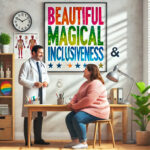Mentoring – a gem in the recovery toolbag
Mentoring – a gem in the recovery toolbag
Mentoring is one of the most under-valued skills and gifts around. The dictionary describes a mentor as ‘an experienced and trusted adviser’. Shannon Cutts is this and much more. I met Shannon at the 2009 NEDA conference in Minneapolis. There she was, with her lovely long hair and gorgeous smile, exactly as you see in this picture. Except Shannon was not sitting still. She was dashing here and there, meeting and embracing as many people as possible, between the conference sessions. Somehow I managed to nab her for a few minutes, long enough learn that here was one special lady who is on a life mission to help others. Shannon shares her inspiring story:
When I am asked what was the greatest contributing factor to my successful recovery from an eating disorder, I always
answer with one enthusiastic word, “mentoring!” I had suffered from anorexia and bulimia for eight years before I met my first mentor, which I write about in the book I authored on how mentoring can support people in recovery from eating disorders, Beating Ana: how to outsmart your eating disorder and take your life back.
Meeting my mentor gave me the strength to feel like I was not alone in my fight to recover, and perhaps most importantly, in my belief that recovery was possible for me. Because I conducted the bulk of my recovery work in the 1980s and early 1990s, when there was far less information publicly available about eating disorders, the quiet, private support of my first mentor, and then a long line of other mentors who followed, was my sole source of support as I continued my recovery journey.
 I founded MentorCONNECT to share the gift of mentoring with other recovering people. I certainly didn’t plan on founding an organization in the eating disorder field – in fact, my dream for recovered life was to return to pursuing music and songwriting, which were my twin first loves. But one thing led to another, and as I began to quietly and privately volunteer my time to support other recovering people whom I met through my music, I realized that my experience of being mentored was being replicated from the other side of the coin in their gratitude for the chance to talk with a person who had actually recovered from an eating disorder. Without even realizing it, I had transitioned from being mentored to becoming a mentor myself (although to this day I also have a mentor who continues to support me). I also started to receive emails from other people who told me they were recovered too and wanted to give back by supporting recovering people. This sparked my imagination and I thought “what if we could match up recovered and recovering folks in mentoring teams?”
I founded MentorCONNECT to share the gift of mentoring with other recovering people. I certainly didn’t plan on founding an organization in the eating disorder field – in fact, my dream for recovered life was to return to pursuing music and songwriting, which were my twin first loves. But one thing led to another, and as I began to quietly and privately volunteer my time to support other recovering people whom I met through my music, I realized that my experience of being mentored was being replicated from the other side of the coin in their gratitude for the chance to talk with a person who had actually recovered from an eating disorder. Without even realizing it, I had transitioned from being mentored to becoming a mentor myself (although to this day I also have a mentor who continues to support me). I also started to receive emails from other people who told me they were recovered too and wanted to give back by supporting recovering people. This sparked my imagination and I thought “what if we could match up recovered and recovering folks in mentoring teams?”
Creating a mentoring community …
So I began to search around to find out if there was already a website or organization that helped match recovered folks like myself with people who were still struggling to recover. There is a similar type of mechanism within the Twelve Step communities, which I deeply respect, but sponsoring was not an exact match for the type of mentoring experience I had had, nor was it what the recovering people who were contacting me for support were requesting or what the aspiring mentors were wanting to give. I began to see mentoring not as a replacement for the Twelve Step approach, but simply as another option. Through my own personal recovery experience I believed and continue to believe deeply that recovering people are each so unique in their background and support needs that the more options we have to offer them, the better.
So I started to brainstorm a community that would eventually become MentorCONNECT. I enlisted the help of my longtime mentor, Lynn, and several professionals in the community, including Jenni Schaefer, Doris Smeltzer, and others to post a little blurb on their blogs sharing that volunteer eating disorder mentors were available. I had such an overwhelming response that I knew an organization like MentorCONNECT would be welcomed within the eating disorder community of recovering and recovered folks.
Members in 16 countries …
So then I gathered together a group of collaborators and fellow eating disorder survivors, some of whom are still serving on our leadership board to this day, to help me expand the vision for MentorCONNECT. We worked for a year and a half to design the community, and then launched it in 2009. We received our approval from the IRS to function as a tax exempt 501c3 nonprofit organization in 2011, and currently we have several thousand members from 16 countries. Our members include females and males, ages 14-70+, from all walks of life and backgrounds, and from the full spectrum of eating disordered issues. Fully 10 per cent of our community comprises recovered folks who make up our all-volunteer leadership and staff and serve as mentors. Our mentors are the heartbeat of MentorCONNECT.
‘Like a big sister …’
When we first launched, we received a lot of questions from professionals, family members, and recovering folks about mentoring. A mentor is an individual who has personal first or secondhand experience with eating disorders, who volunteers their time to share their personal strength, experience and hope – when asked to do so – in a strictly non-medical, non-clinical way. A mentor is like a big sister or brother who is a little further up the recovery road and can serve as an example that recovery is possible. Mentors answer questions from their mentees about what the recovery process was like for them, brainstorm how to stay committed to recovery, and generally serve as a cheerleader and source of encouragement and support to their mentees that the hard work of recovery is worth it. There is a strict delineation between the role of a volunteer mentor and the role of a treatment professional, which we describe in detail in our Cooperation with Professionals Committee Packet which is available on our website. Our mentors also receive training before and during their service to help them better focus their time with their mentees.
Increases motivation to recover …
Through a partnership with Dr Marisol Perez and the eating disorders research department at Texas A&M University, MentorCONNECT conducted our first research study in late 2010 to determine how mentoring can best be a source of help and support to our members. We learned that mentoring improves willingness to attend treatment sessions and to comply with the treatment team’s guidance, improves future quality of life, and increases the motivation to recover. Mentoring also assists the mentee with building relational skills that can strengthen bonds with the treatment team and others. For mentors, serving as a mentor lends meaning and value to the recovery journey, solidifies their own commitment to recovery, and offers a way to stay connected to the recovery community in a leadership role.
Consistent source of recovery support …
What these results tell us is that the effect of a mentor in the integrated eating disorders treament model is consistent with the use of mentoring as a high quality source of pro-recovery ancillary peer support, but not as a substitute or replacement for professional treatment. MentorCONNECT sees our no-fee support services as a valuable adjunct and support to the life-saving work that professional treatment providers offer our members. Interestingly, our study also highlighted that approximately 30 per cent of our members at any given time have little or no consistent access to professional treatment, and for these members, our services comprise the only consistent source of recovery support that they receive. This is far from ideal, but it is a factor in our future goals and plans for strengthening and expanding our services and for keeping all services free of charge. As a nonprofit organization, we rely on financial donations from organizations and individuals to meet our financial needs and significant donations of time and service from our leadership and staff (including myself as the current Executive Director) to provide support services to our growing community.
For more information and to join MentorCONNECT, please visit us at www.mentorconnect-ed.org
PS from June: Thank you, Shannon, for the great work that you do, and thank you to your many helpers, too.







